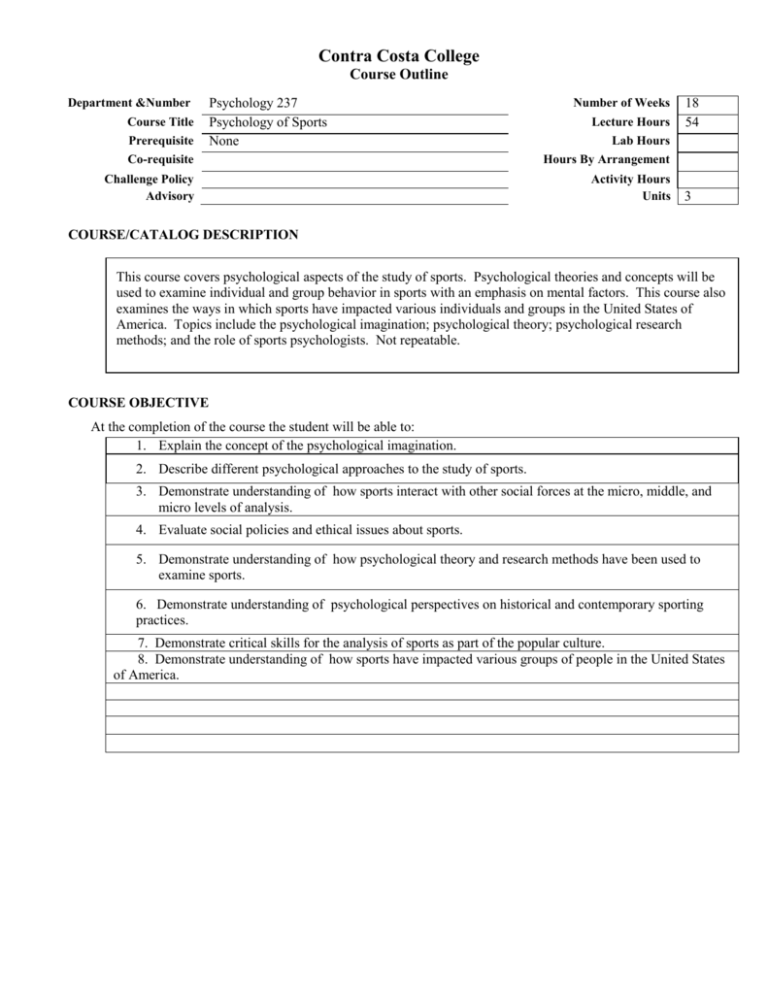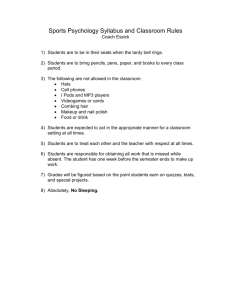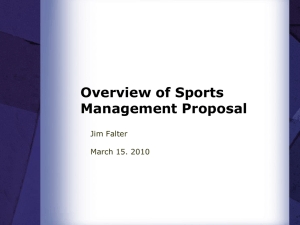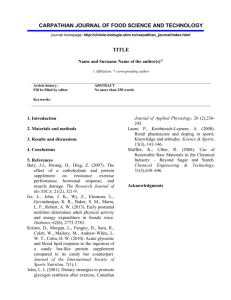CONTENT REVIEW CHECKLIST
advertisement

Contra Costa College Course Outline Department &Number Course Title Prerequisite Psychology 237 Psychology of Sports None Number of Weeks Lecture Hours Lab Hours Co-requisite Hours By Arrangement Challenge Policy Advisory Activity Hours Units 18 54 3 COURSE/CATALOG DESCRIPTION This course covers psychological aspects of the study of sports. Psychological theories and concepts will be used to examine individual and group behavior in sports with an emphasis on mental factors. This course also examines the ways in which sports have impacted various individuals and groups in the United States of America. Topics include the psychological imagination; psychological theory; psychological research methods; and the role of sports psychologists. Not repeatable. COURSE OBJECTIVE At the completion of the course the student will be able to: 1. Explain the concept of the psychological imagination. 2. Describe different psychological approaches to the study of sports. 3. Demonstrate understanding of how sports interact with other social forces at the micro, middle, and micro levels of analysis. 4. Evaluate social policies and ethical issues about sports. 5. Demonstrate understanding of how psychological theory and research methods have been used to examine sports. 6. Demonstrate understanding of psychological perspectives on historical and contemporary sporting practices. 7. Demonstrate critical skills for the analysis of sports as part of the popular culture. 8. Demonstrate understanding of how sports have impacted various groups of people in the United States of America. COURSE CONTENT: (In detail; attach additional information as needed and include percentage breakdown) % Psychological imagination. 10 10 10 10 20 % % % % Psychological approaches to the study of sports. Interaction of sports and other social forces. Evaluation of social policies and ethical issues about sports. 10 10 20 % Contemporary and historical sporting practices. % Analysis of sports as part of the popular culture. % Impact of sports on various groups in the United States of America. Psychological theory and psychological research methods. METHODS OF INSTRUCTION Lectures Large and Small Group Discussions. Audio-Visual Presentations Videos/DVDs Selected Readings INSTRUCTIONAL MATERIALS Textbook Title: Course Reader Author: Publisher: Edition/Date: COURSE EXPECTATIONS (Use applicable expectations) Outside of Class Weekly Assignments Hours per week Weekly Reading Assignments 2 Weekly Writing Assignments 2 Weekly Math Problems Lab or Software Application Assignments Other Performance Assignments 2 STUDENT EVALUATION: (Show percentage breakdown for evaluation instruments) 33 33 34 % % % Midterm examination. Final examination. Two term papers and classroom participation. GRADING POLICY (Choose LG, CR/NC, or SC) X Letter Grade 90% - 100% = A 80% - 89% = B 70% - 79% = C 60% - 69% = D Below 60% = F Prepared by: Course New/Revision Date: Course Effective Date: Revised 11/07 Credit / No Credit 70% and above = Credit Below 70% = No Credit J. Vern Cromartie May 2010 Spring/2011 Student Choice 90% - 100% = A 80% - 89% = B 70% - 79% = C 60% - 69% = D Below 60% = F or 70% and above = Credit Below 70% = No Credit CONTRA COSTA COLLEGE Course-Level Student Learning Outcomes with Assessment Methods and Criteria Department Name: Course Title: Social Sciences Course Number: Psychology of Sports Is this course required for completion of a degree, major(s), or certificate program(s)? If yes, which degree/major(s)/certificate program(s)? Degree: AA AS Major(s): Psychology Certificate of Achievement? Certificate of Achievement? Certificate of Achievement? Certificate(s) of Completion: Does this course satisfy a GE requirement(s)? X Yes If yes, which requirement(s)? A. Language & Rationality English Composition X Psychology 237 Yes X No Yes Yes Yes X X X No No No No Oral Communication & Critical Thinking B. Natural Science w/ Lab C. Arts and Humanities D. Social Sciences F. American Institutions H. Physical Education Activity I. Mathematics Proficiency J. Computer Literacy K. Cultural Pluralism G. Health Education L. Information Competency Intended Outcome Students will demonstrate knowledge of the psychological imagination. Assessment Method Students will answer embedded questions in tests. Assessment Criteria At least 70% of the students will answer embedded test questions correctly. 2. Students will demonstrate knowledge of the concept of status. Students will answer embedded questions in tests. At least 70% of the students will answer embedded test questions correctly. 3. Students will demonstrate knowledge of the concept of role. Students will answer embedded questions in tests. At least 70% of the students will answer embedded test questions correctly. 1. 4. 5. You may have more (or fewer) than five outcomes. Attach separate pages as needed. See following document for examples and definitions. 03/26/07 CIC approved





